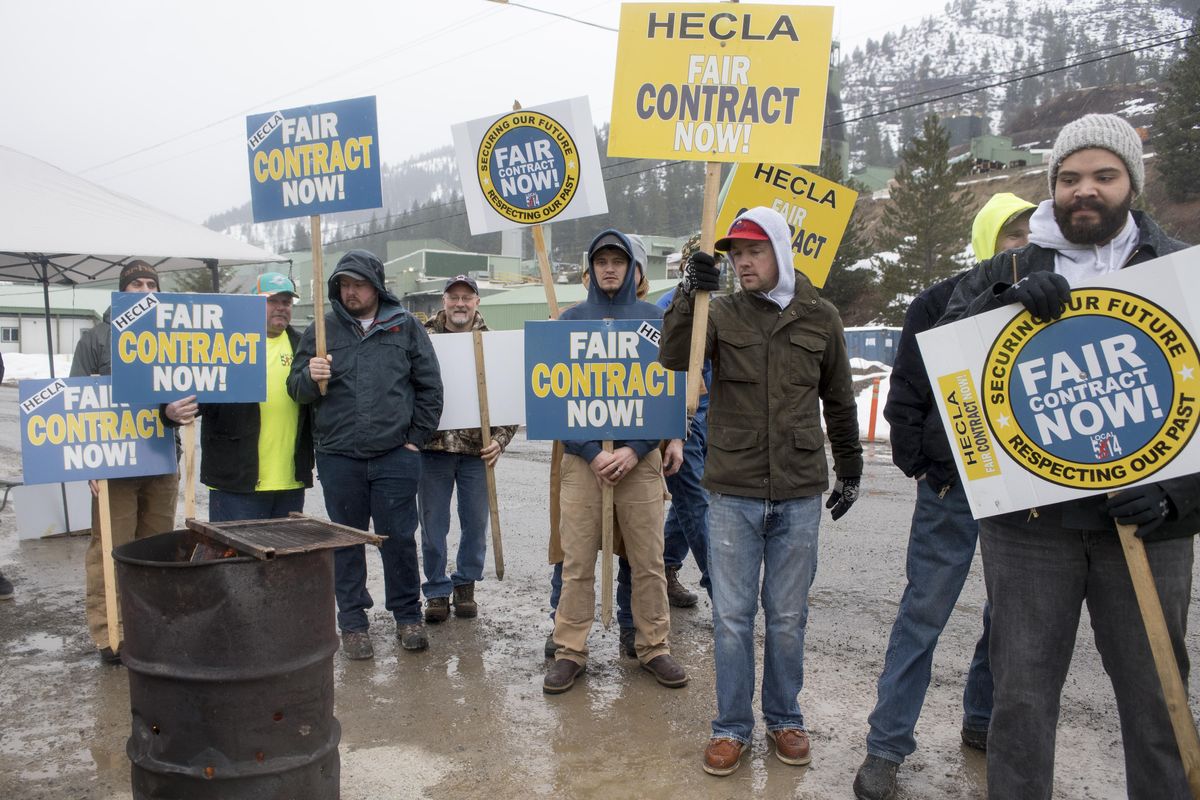Silver Valley miners strike, shutting down Lucky Friday mine

MULLAN, Idaho – Rick “Redman” Norman and about 60 other miners spent Monday morning doing something they’ve never done before at the Lucky Friday mine in the Silver Valley: picket, not work.
“We’re not even asking for nothing,” the long-time worker said while huddled near a steel drum with orange flames peaking out. “We’re asking to basically keep things the way they are.”
On Sunday night, members of United Steelworkers local 5114 voted 230-2 in favor of striking. On Monday morning, they made good on their promise. At 5:30 a.m. Norman and other workers grabbed signs and boxes of hand warmers – not hard hats – and started the strike near the entrances to a mine where some of them have worked for four decades.
“The goal is that somebody will come to their senses and we’ll all go back to work,” Norman said. “We just want to go back to work.”
In April 2016, the previous six-year contract between the Coeur d’Alene-based Hecla Mining Co. and the union expired. Both sides met several times with a federal mediator to try and move forward but came to an impasse in February when neither side would budge.
Hecla’s proposal would change workers’ health care benefits, shift and vacation scheduling, and bonus pay tied to silver premiums, which previously were awarded based on the price of silver, among other proposals.
The company says it’s trying to cut costs at a mine it deems one of the more expensive to operate in a portfolio of locations in Alaska, Canada and Mexico. The Lucky Friday mine produced 3.6 million ounces of the 17 million ounces of silver that Hecla generated in 2016.
From the worker’s perspective, corporate is trying to change a way of life and thinking that have dominated Lucky Friday for over 70 years. And they’re doing so by not budging an inch, miners say.
“The miners consider this offer to be a slap in the face,” said Steve Powers, a Steelworkers representative based out of Spokane. “A lot of them have been here for 15-plus years. They made it through the hard times already.”
But for a company that reported overall income of $69 million last year on sales of $646 million, supporting Lucky Friday is hard times, said Luke Russell, the vice president of external affairs. He said the mine has been operating in the red by about $200 million over the past five years.
“The changes we need to make is to make Lucky Friday productive and safe for years to come,” he said. “The mine needs to stand on its own and be cost effective.”
The strike comes as Hecla is about to begin mining deeper ore that can be accessed with its new No. 4 shaft, which reaches almost 2 miles underground. Russel said this and other equipment changes have set the mine up for success.
The last cog yet to fit into place is the contract, which they say is similar to the industry average, including their other mines.
“It’s costing more to operate than it does to not operate,” Russell said. “We need to get this cost down to make these changes.”
But from the miners’ perspective – which often is several thousand feet under the surface – decisions coming from a corporate office 60 miles away often don’t consider everyone’s perspective.
Andrew Thompson is 41 and has worked at the mine for 11 years. In that time, he’s never seen a contract like this from Hecla, and he’s never seen the company so unwilling to budge.
“The company claims to be bargaining with us, but bargaining has nothing to do with forcing things on us,” Thompson said. “Implementation is not bargaining.”
He lives in Mullan and has a wife and three kids in school that all rely on his wages. Which is why, since he voted to strike Sunday, he’s already looking for work.
“That’s what the majority of us have done,” he said, standing near an empty parking lot that normally would be full of workers’ vehicles.
Powers, the union rep, said workers are digging in and aren’t going to budge. By his estimation, an agreement could come as quickly as a few days or as long as a few years. It all depends on how much Hecla is willing to negotiate, he said.
“The union has stated all along there is not an impasse,” he said. “We have room to move. Yet the company won’t budge.”
The company indicated the same, yet maintained it has budged on certain items, yet is unwilling to concede on others. Still, Russell said the new contract was necessary to make the mine profitable. And with the mine shut down, it was technically costing them less than before.
As for Norman, who derives his “Redman” moniker from his red hair and large, bushy red beard that has gone to gray with age, he’s ready to stick it out, as are the other miners.
“These are the most resilient people you will ever meet,” he said. “They’re gonna be fine. But when I think of the wives, the kids, the people who rely on this, that’s when my blood starts to boil.”
Since 1983, he has proudly called himself a miner. But right now?
“I’m just a picket guy.”